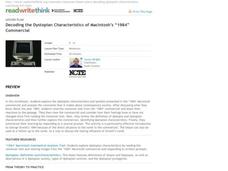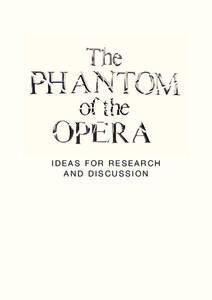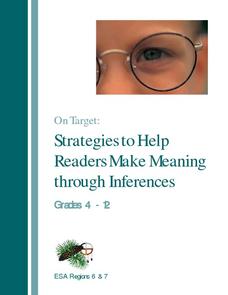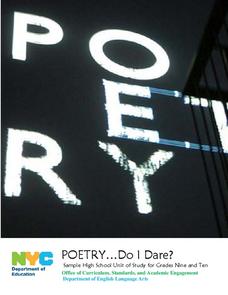MENSA Education & Research Foundation
Magical Musical Tour: Using Lyrics to Teach Literary Elements
Language arts learners don't need a lecture about poetry; they listen to poetry every day on the radio! Apply skills from literary analysis to famous songs and beautiful lyrics with a instructional activity about literary devices. As...
MENSA Education & Research Foundation
I Need a Superhero
Once the class learns about the hero's journey, they'll find it in every story and movie they see! Take characters from their humble beginnings to their atonement and apotheosis with a set of lessons about the hero's journey focusing...
ReadWriteThink
Decoding the Dystopian Characteristics of Macintosh’s “1984” Commercial
Known as one of the most iconic advertisements of the 20th century, Macintosh's "1984" commercial has become more of a social statement. Present the ad to a new audience of viewers with a lesson focused on identifying dystopian...
Phantom of Opera
The Phantom of the Opera: Ideas for Research and Discussion
You could spend a full day discussing The Phantom of the Opera and not scratch the surface, but a set of lessons about the literary elements and themes of the musical production is a great start. Young thespians build upon the background...
Curated OER
A Study Guide for The Phantom of the Opera
Immerse yourself in the beautiful, twisted world of Andrew Lloyd Webber's The Phantom of the Opera. A detailed lesson plan provides important details about the writing, stagecraft, music, and literary elements of the famous musical, as...
ReadWriteThink
Style-Shifting: Examining and Using Formal and Informal Language Styles
Your high schoolers are probably versed in two languages: formal language, and informal conversation. Help them identify the correct language style for their audience and context with a thorough lesson and examples of different speech...
K12 Reader
If
Rudyard Kipling's advice to his son in the poem "If" is a resounding message that echoes through generations. After reading the famous poem, middle schoolers work on analyzing specific lines, completing activities based on unfamiliar...
Curated OER
On Target: Strategies to Help Readers Make Meaning through Inferences
Here's a resource that explicitly teaches, models, and provides readers with opportunities to practice the process of drawing inferences from text. Packed with strategies elementary, middle, and high school teachers can use, the resource...
New York City Department of Education
Poetry…Do I Dare?
Whether you're considering a poetry unit or just want to incorporate more poetry in your curriculum, this unit plan is a must-have. Packed with poems, teaching points, powerful prompts, and poetry performance suggestions, the resource is...
Teacher's Corner
Dr. Seuss Book Report - Solution
A great way to incorporate a beloved author into the classroom. This book report learning exercise requires young readers to write a short summary of their favorite Dr. Seuss book. It's up to you to decide how long the summary should be....
Teacher's Corner
Dr. Seuss Book Report - Problem
A simple book report worksheet requires young readers to write a short summary of their favorite Dr. Seuss book. It's up to you to decide how long the summary should be. Lastly, individuals illustrate the problem in the book.
Teacher's Corner
Dr. Seuss Book Report - Setting
A great way to incorporate a beloved author into the classroom, especially during the month of March. This book report worksheet requires young authors to write a short summary of their favorite Dr. Seuss book. It's up to you to decide...
Teacher's Corner
Dr. Seuss Book Report - Scene
A one-page book report activity requires young readers to write a short summary of their favorite Dr. Seuss book. It's up to you to decide how long the summary should be. Lastly, individuals draw an illustration of their favorite...
Dr. Seuss Enterprises
Dr. Seuss in the Classroom
Explore the works of Dr. Seuss, such as Horton Hears a Who, Horton Hatches and Egg, The Sneetches and Other Stories, The Lorax, The Butter Battle Book, and Yertle the Turtle and Other Stories. Each story lesson includes reading...
Teacher’s Pet Publications
A Common Core Approach to Teaching Of Mice and Men
Whether or not your school/state has adopted the Common Core standards, you will want to add this resource to your Of Mice and Men curriculum materials. The chapter-by-chapter activities ask readers to provide evidence from the novella...
Center for Open Educational Resources and Language Learning
Reading Activity
Ready to integrate technology into your ELL instruction? Check out this reading instructional activity that has language learners using the Internet and apps, joining online book clubs, and creating blogs. A fine model of what can be done.
Ministry of Education - Ontario
Reading Between the Lines
Learning to read between the lines, to recognize the on-the-surface meaning as well as the implied or inferred meaning of text, is an important skill for all readers. The materials and activities in this 73-page packet are designed to...
Illinois State Board of Education
Common Core Teaching and Learning Strategies
Here's a resource that deserves a place in your curriculum library, whether or not your school has adopted the Common Core. Designed for middle and high school language arts classes, the packet is packed with teaching tips, materials,...
Curated OER
Close Reading Passages of Literature
Encourage kids to think deeply about what they are reading with five thought-provoking questions about one passage. After choosing a passage that is intriguing or confusing to them, learners write a summary, explain what they like or...
Waunakee Community School District
Identifying Themes in Literature
If your language arts learners have a hard time determining the universal theme of a written work, use a straightforward instructional activity to help them find it. After reviewing a list of common themes, kids note the title,...
Scholastic
Reading Characters
Philip Pullman's The Golden Compass provides the text for a study of how writers bring characters to life. Using the provided character mapping worksheets, readers respond to questions and then write a short character sketch.
Cleveland Museum of Art
Japanese Folktales (Asian Odyssey)
The Cleveland Museum of Art presents this interdisciplinary model unit that asks class members to explore how the same themes are presented in the folktales and art of several cultures.
Teaching English
In Flanders Fields
War is one of the most profound human experiences in history, and is often best depicted in works of art and literature. Introduce class members to the poetry of World War I with this resource that uses John McCrae's "In Flanders Fields"...
Curated OER
Narrative of the Life of Frederick Douglass an American Slave, Written by Himself
The narrative works of Frederick Douglass engage learners in the topic of slavery. They will experience American history in a new way, a Douglass expresses his thoughts in his own words. Pupils then interpret this literary work.

























